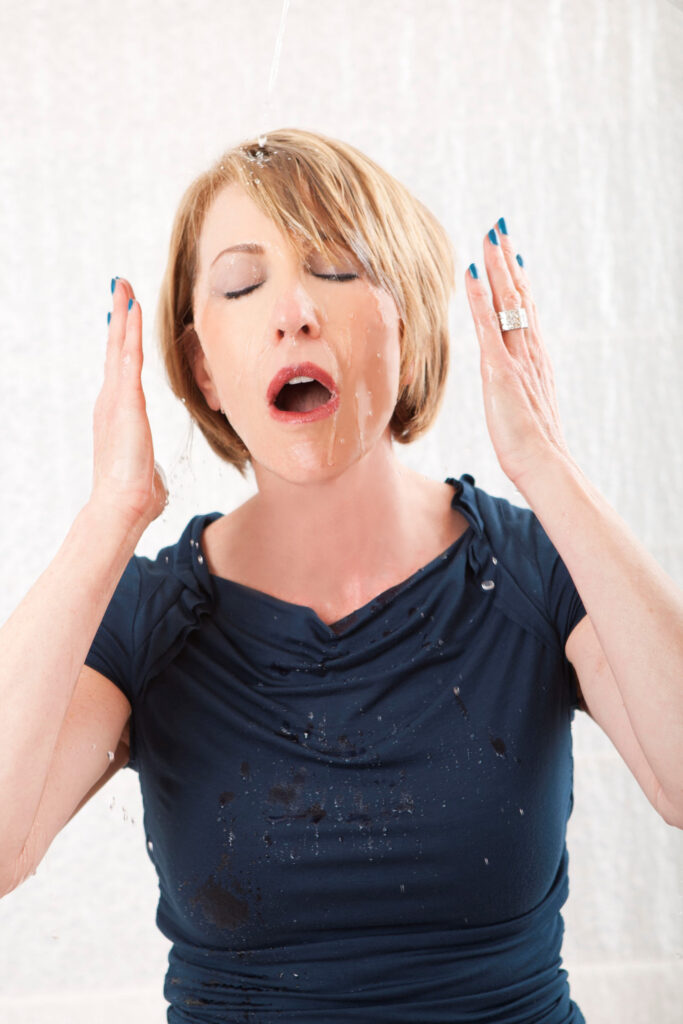Are you experiencing your own internal heatwave and seriously considering moving to the North Pole? If so, you’re not alone.
According to the North American Menopause Society (NAMS), hot flashes affect 3 out of 4 women and can last 7-10 years. If you’re one of them, you know it’s more than a seasonal heatwave.
Here is my definition of a hot flash: When your estrogen levels begin to decrease, they can trigger your body’s thermostat to send a signal that you are overheated. This causes your body to send out an all-hands-on deck alert: your heart pumps faster, the blood vessels in your skin dilate to circulate more blood to radiate heat, and your sweat glands release sweat to cool you even more. Your body cools down when it otherwise wouldn’t, and you are left feeling miserable: soaking wet in the middle of a board meeting like me or in the middle of a good night’s sleep. If you have had your ovaries surgically removed and suddenly enter menopause, you can suffer severe hot flashes that start right after surgery. Regardless of how and when you begin flashing, these hot flashes can result in: interruption of daily activities, difficulty sleeping, anxiety, feeling out of control or helpless, and a lack of intimacy. Oh joy!
At the 2021 NAMS convention it was explained that for most women under 60 who are within 10 years of menopause, hormone therapy (HT) is still the most effective way to manage hot flashes. However, there are many women who need or want other options.
Here are a few of the newer options that are under review:
- Oxybutynin – This is currently used to treat overactive bladder and overactive sweating. In a 2016 trial, women reported experiencing reduced frequency and severity of hot flashes and better sleep! Now that’s a win-win! It was reported that there are some harmful effects of long-term use, but not short-term use.
- Estetrol (E4) is a naturally occurring estrogen with selection action in tissues that is produced by the fetal liver and crosses the placenta. Estetrol was recently approved as an oral contraceptive under the name Estelle, it’s also under investigation as a postmenopausal regimen. Preliminary findings suggest it reduces vasomotor symptom severity by 44%.
- NK3 antagonists are being studied for hot flashes. A recent discovery found that kisspeptin, neurokinin B, and dynorphin (KNDy) neurons may play an important role in the cause of vasomotor symptoms. Overall, NK3 inhibitors appear to be generally well tolerated. Dr. Susan Reed, MD, MPH, Medical Director for NAMS, gave a presentation on the novel KNDy receptor drugs. She is Professor Vice-Chair of the Department of Obstetrics and Gynecology at the University of Washington School of Medicine in Seattle. I found her explanation helpful, “What happens at menopause is that these neurons have just been cooking along up there, doing their thing. They interact with the GnRH pulse generator that helps with orchestration of ovulation. But when estrogen levels fall, this whole complex of neurons goes into hyperdrive, and their impulses spill over into the immediately adjacent hypothal brain region – the thermoregulatory center. When estrogen falls, it causes this KNDy neuron complex to just basically go bonkers. It’s like turning on a bazillion fire hydrants and the fire hydrants spill over into the thermoregulatory center and cause dysregulation.”
There are some things that you can do on your own to help keep those hot flashes at bay. If you like your coffee and Danish in the morning, a smoke and a cocktail after work, and turn into a couch potato in your free time, you may want to rethink your lifestyle choices. I’m not saying you have to go cold turkey to nix hot flashes, but you could try to reduce your intake of caffeine and alcohol, as well as refined sugar and spicy foods — all of which can contribute to hot flashes. As for smoking, no if and or butts, smoking is detrimental to our health on many levels. You might find eating a plant-based diet could help keep those hot flashes at bay. Read my interview with I interviewed Dr. Neal Barnard, MD, FACC, an Adjunct Professor of Medicine at the George Washington University School of Medicine in Washington, D.C., about his recent study on the impact of a plant-based diet on hot flashes. Dr. Barnard has led numerous research studies investigating the effects of diet on diabetes, body weight, chronic pain, and hot flashes.
As you can see, there are lots of options to deal with those not-so-hot-flashes! You CAN and SHOULD get help with those intense heat waves, power surges, and dripping sessions! Reach out to your menopause specialist and get the help you need and deserve!!
Remember: Suffering in silence is OUT! Reaching out is IN.
Sign up for Menopause Mondays® Hot News Flashes
Be sure to follow me on Instagram @menopause_mondays.
Download my free eBook: MENOPAUSE MONDAYS The Girlfriend’s Guide to Surviving and Thriving During Perimenopause and Menopause.
Sign up for my fun YouTube Videos!
*EllenDolgen.com does not recommend, endorse, or make any representation about any tests, studies, practices, procedures, treatments, services, opinions, healthcare providers, physicians, or medical institutions that may be mentioned or referenced.





